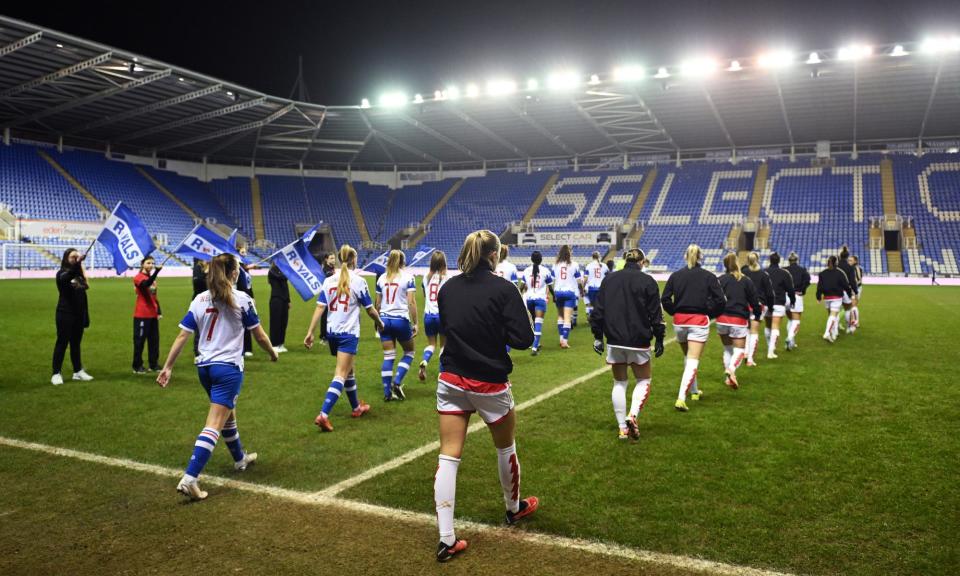The sad demise of Reading Women – and why we should have seen it coming

Were it not for some diligent reporting you would probably have missed the most significant women’s football news – that Reading told the FA they would not be able to compete in the Championship next season. Women’s FA Cup semi-finalists in 2019, Reading have a rich history in the game, competing in the top division throughout the WSL’s formative professional years.
It would have been harder to miss that Manchester United are moving their women’s team to portable buildings to give the men’s team access to the women’s training facilities while their own are being upgraded.
But Reading’s situation is simply the Manchester United example in sharp relief. Instead of losing nice shower blocks, staff and players at Reading have lost their jobs. Young girls have lost their talent pathway. The Championship loses a team in what is already too small a league.
Related: Manchester United Women are being hindered by indifference and confusion | Suzanne Wrack
Both stories, however, show how quickly and easily women’s football can be sidelined. But neither story is surprising, nor are they unique to those clubs. It will happen again. And sadly, we are all responsible.
In our hunger to reverse the social, cultural and economic consequences of a 50-year ban on women’s football in this country, we the fans, journalists, sponsors, players, club owners, coaches, staff, the FA, broadcasters and league officials, have expectations and demands that have led to policies that mean women’s teams are more dependent on men’s football than ever before.
Year on year, the licence requirements to play in tier two, such as the number of support staff, player contact hours, floodlight lux level, ground capacity and even the number of turnstiles you have, increase at a rate disproportionate to the revenue being generated centrally and at club level. They are usually only possible to adhere to, at the short notice often provided, if you are affiliated to a big-sized men’s team. That dependency creates an imbalance of power that can come to bear at any moment – whether an ownership crisis or the need to update outdated training facilities.
As somebody who worked at the second-tier club Lewes to implement these requirements to maintain our licence, it often felt as though the changes were designed to help women’s teams within big men’s clubs to force the hand of their ownership groups to provide more help rather than to support teams to go down the path of sustainable growth. So while we – a 100% fan-owned club – worked hard to almost double our attendances over five years, increase sponsorship 20-fold and create award-winning match-day experiences, we could never keep up. It may be quicker to hit certain standards in the short term, but what are we losing by sacrificing our autonomy?
Few licence requirements were and are in place around great fan experience. There were no incentives to hit certain revenue targets or make more money off our own backs through merchandise or match days. Unequal FA Cup prize money still means clubs are incentivised to support a men’s FA Cup run over a women’s FA Cup run – even if the women’s team are more likely to win more games and be more successful. There is no means-testing of clubs, nor bespoke action plans, to support the beautiful, unique and interesting women’s clubs that have rich stories and cultures and different club structures or ways of working.
The current approach is not helpful for women’s clubs who have earned the right to be in a certain tier but who cannot keep up with the sometimes arbitrary priorities set, often based on the men’s game.
So while the Reading story will be presented as one of a uninterested ownership group – which of course it is – it is also an effect of having created structural incentives toward dependency on men’s ownership groups whose level of interest simply cannot be controlled by women’s football actors.
There are of course some sparks of optimism. Thornaby’s reversal of their decision to remove all female teams after a public backlash shows that there is a level of people power that owners and directors of clubs are forced to listen to now. Michele Kang has invested heavily in standalone women’s club London City Lionesses and hopes to rewrite the story of dependency on men’s clubs that way.
We are told that the revenue will come. We just need five (more) years of leaning on men’s clubs before we start to break even and then grow. Sadly, by then, our dependency on men’s teams will be hard to wean off and we will probably have seen that Reading was far from unique.
The Karen Carney review called for “the game … to grow in its own right to reach its true potential and stand on its own two feet”. That’s not a recommendation that should be postponed any longer. Which is why the Reading story that is passing by with barely a murmur, really deserves more attention.
Maggie Murphy is the former CEO of Lewes FC
Get in touch
If you have any questions or comments about any of our newsletters please email moving.goalposts@theguardian.com
This is an extract from our free weekly email, Moving the Goalposts. To get the full edition visit this page and follow the instructions.

 Yahoo Sports
Yahoo Sports 
